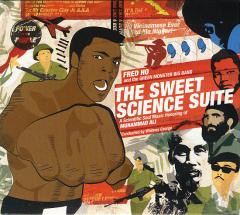Fred Ho And The Green Monster Big Band / The Sweet Science Suite: A Scientific Soul Music Honoring Of Muhammad Ali
Bobby Zankel, Jim Hobbs (alto sax); Bhinda Keidel, Salim Washington (tenor sax); Ben Barson, Fred Ho (baritone sax); Winston Byrd, Stanton Davis, Nabate Isles, Amir ElSaffar (trumpets); Bob Pilkington, Marty Wehner, Richard Harper (trombones); Earl McIntyre (bass trombone); David Harris (bass trombone, tuba); Amanda Monaco (guitar); Art Hirahara (keyboards); Wes Brown (bass); royal hartigan (drums, percussion); Haleh Abghari (vocals); Whitney George (conductor)
"Ho’s arrangements are as outstanding and unique as Ali’s boxing style." Ken Waxman, JazzWord
The Sweet Science Suite is a musical evocation of Muhammad Ali's "mojo" conjured through Afro Asian scientific soul music, combining the "swing" of "jazz" and American and Asian boxing, martial arts and hand-to-hand combat "feels" and forms, with the elasticity of temperament and pitch intrinsic to the raw, "folk" musical characteristics of AfroAmerica and much of the Asiatic world. During Ali's match against the juggernaut George Foreman in Zaire during the mid-1970s, Ali's employ of the "rope-a-dope" was the quintessential methodology of the trickster, intrinsic to many Asian martial arts, such as JuJitSu, of turning the strength of one's opponent against them. This work of five movements spans the musical geography of the Black and Yellow worlds, just as Ali spanned those two worlds in his boxing training and abilities, and in turn inspired and influenced martial forms and techniques, including the footwork of the late great martial arts innovator and iconoclast, Bruce Lee.
An added two-track bonus on this recording include the Jacob Epstein arrangement of Ellington's classic In A Sentimental Mood, now re-titled by Fred Ho as In A Pan African Mood, an evocation and conjuring to mother Africa and its cultural heritage as the source for anti-imperialist and anti-technocentric inspiration. The second bonus track features Persian American vocalist Haleh Abghari and baritone saxophonist Fred Ho employing esoteric and extended techniques for both, on the Ho composed works based the James Tate poem "Teaching the Ape to Write Poems."
During his war against advanced colo-rectal cancer (from 2006), which included two primary tumors and two recurrences, Fred Ho, hammered by massive chemo and radiation, found inspiration in the fight for his life from watching movies of The Greatest, Muhammad Ali.
Ali's bold, militant, defiant and spirited resistance to the forces of American racism, combined with his élan, grace and humor (both poetical and personal), his indisputable athletic abilities and genius, and the inspiration to the world's peoples (especially the oppressed) and their embrace of him, served as constant inspiration to Fred Ho. During one of his recovery periods, Ho decided to compose a work for his Green Monster Big Band to honor The Greatest.
TRACK LIST
Shake Up The World! (9:52)
Float Like A Butterfly, Sting Like An Afro Asian Bumblebee! (10:580
No Vietnamese Ever Called Me Nigger! (16:35)
Rope-A-Dope (8:23)
Worthy Of Praises Most High (aka The Greatest!) (13:15)
In A Pan-African Mood (9:51)
Teaching The Ape To Write Poems (5:13)
REVIEWS
Appreciating the political subtext of someone dubbed athlete of the century is The Sweet Science Suite a five-part suite Ho composed for his 19-piece Green Monster Big Band. An activist as well as a musician, Ho’s arrangements are as outstanding and unique as Ali’s boxing style. Unafraid of outside references, on Shake up the World, the piece’s staccato exposition quotes liberally from Cream’s Sunshine of Your Love for a proper period feel, although that theme is intertwined with vamping section work echoing the Count Basie band, a funky backbeat, fiery brass triplets and a slinky boppish tenor sax solo. Other variants, such as Rope-A-Dope frame Salim Washington’s muscular big-toned tenor saxophone in a lusty big band arrangement that’s part ballad and part free form. Still other tunes expose and bury references to interludes ranging from Chinese court music to American TV show themes, to speeding train-like riffs plus Charles Mingus’ particular blend of gospel and blues. Other examples of bravura (over) blowing include Ho double-tonguing a staccatissimo baritone sax interlude from pedal point to altissimo range that is outlined clearly among brass fanfares and gruff snorts from two bass trombones plus broken beats from percussionist Royal Hartigan. The climatic key to the suite is the constantly expanding No Vietnamese Ever Called me a Nigger, where Hartigan’s stylized gongs and hammered cross tones suggest the sounds of the Viet Nam War Ali avoided, costing him his championship status. Throughout the more-than-16½-minute narrative, sonic interpolations, encompassing split-second theme inferences, bluesy harmonies from the six-piece sax section, twanging guitar riffs, discordant trumpet blasts, pedal-point bass trombone snorts and a final, unexpected, smoothing coda describe the discordance of the era and its final resolution. This resolution, personified by abrasive guitar solos and split-tone reed explosions, leads to Worthy of Praises Most High, a concluding theme that acknowledges Ali’s undiminished skill. Triumphantly fortissimo and atonal, the finale highlights guitarist Amanda Monaco’s rock-like chording arching over sequences of juddering pitch dislocation from brass triplets until decisive orchestral calmness prevails.

